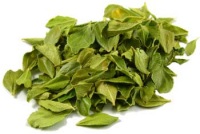Buchu is a plant. The leaf is used to make medicine.
Contents
Uses
- Buchu is used to disinfect the urinary tract during infections of the bladder (cystitis), urethra (urethritis), prostate (prostatitis), or kidney (pyelonephritis). It is also used to treat sexually transmitted diseases.
- In manufacturing, the oil from buchu is used to give a fruit flavor (often black currant) to foods.
Benefits
Used in the treatment of urinary problems in Africa before Europeans arrived there. The use of buchu can be documented as a treatment for kidney and bladder problems for more than three centuries, and evidence suggests it may have been used as an herbal medicine for thousands of years.
Dutch Afrikaners adopted it for the treatment of kidney stones, arthritis, cholera and muscle aches as well as urinary tract infections (UTI).
There were claims that it had mild pain relieving properties as well, but these have not been verified in laboratory tests.
The Khoikhoi or Khoi, native people of southwestern Africa, developed an alcoholic beverage known as buchu brandy, which is still manufactured and distributed. This brandy was used medicinally by physicians for generations, but has now been discontinued. It is still widely used in home remedies.
Buchu is a common ingredient in many well-known premenstrual prescription medications. In the United States, the plant itself is not recognized as a medicinal herb, but the oils extracted from it are used in commercial medications.
Buchu was first introduced as a patent medicine in New York 135 years ago, and while it no longer sold in the US, it is widely available in Europe.
This plant reportedly acts as a mild diuretic, and clinical tests have demonstrated that these properties are quite gentle, making it effective for minor treatments, but requiring heavier dosages for more severe applications.
Buchu is also being investigated for the treatment of high blood pressure and congenital heart failure. The research today proves to be promising, but no definite scientific statistics are as yet available.
Among many local African cultures, an infusion of the leaves has been used as an herbal treatment for premenstrual syndrome (PMS). It has been adopted for the same use in many other countries as well, and is widely available in holistic and alternative health shops.
Cautions
Digestive Effects
Buchu leaf can cause stomach irritation due to its essential oil components diosmin and pulegone, as explained by Drugs.com. Side effects may include loss of appetite, diarrhea and nausea. An upset stomach is more likely when taking buchu leaf without eating beforehand, according to the Loyola University Health System.
Urinary Tract and Liver Side Effects
People have traditionally used buchu leaf as a diuretic, so the herb may increase frequency of urination if it works as claimed. Use of diuretics can lead to dehydration and electrolyte imbalances. Diosmin and pulegone may be irritating to the kidneys, according to Drugs.com, and pulegone also is hepatotoxic, meaning it can cause liver damage.
Side Effects Specific to Women
Pregnant women should not take buchu leaf supplements, because the substance has uterine stimulant effects and can cause miscarriage, according to Drugs.com. Mountain Rose Herbs notes that breastfeeding women should use “extreme caution” in regard to this substance due to the pulegone content. Menstruating women also should be aware that buchu leaf can increase menstrual flow.
Allergic Reaction
As with any herbal supplement, some people may experience an allergic reaction to buchu leaf. Signs as listed by the LUHS may include a rash, hives, itchiness, swelling, tightness in the chest or throat, chest pain or breathing difficulty. An allergic reaction to buchu leaf calls for immediate medical attention, as it could lead to anaphylaxis. This severe shock reaction involves a sudden drop in blood pressure and severe breathing problems, and it can be life-threatening.
Interactions
- Lithium interacts with BUCHU
Buchu might have an effect like a water pill or “diuretic.” Taking buchu might decrease how well the body gets rid of lithium. This could increase how much lithium is in the body and result in serious side effects. Talk with your healthcare provider before using this product if you are taking lithium. Your lithium dose might need to be changed. - Medications that slow blood clotting (Anticoagulant / Antiplatelet drugs) interacts with BUCHU
Buchu might slow blood clotting. Taking buchu along with medications that also slow clotting might increase the chances of bruising and bleeding.
Some medications that slow blood clotting include aspirin, clopidogrel (Plavix), diclofenac (Voltaren, Cataflam, others), ibuprofen (Advil, Motrin, others), naproxen (Anaprox, Naprosyn, others), dalteparin (Fragmin), enoxaparin (Lovenox), heparin, warfarin (Coumadin), and others.
Other names
Agathosma betulina, Agathosma crenulata, Agathosma serratifolia, Barosma betulina, Barosma crenulata, Barosmae folium, Barosma serratifolia, Bookoo, Bucco, Buccu, Bucku, Bukku, Diosma, Diosma crenulata, Diosma serratifolia, Hartogia betulin, Parapetalifera betulina, Parapetalifera crenulata, Parapetalifera odorata, Parapetalifera serrata, Parapetalifera serratifolia, Round Buchu, Short Buch
References
Source: Live Strong, http://www.livestrong.com/article/154581-buchu-leaf-side-effects/
Herbal Supplement Resource, http://www.herbal-supplement-resource.com/buchu-herb.html

